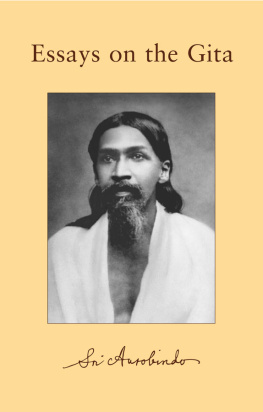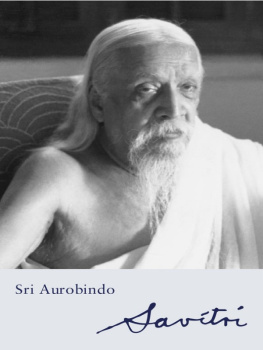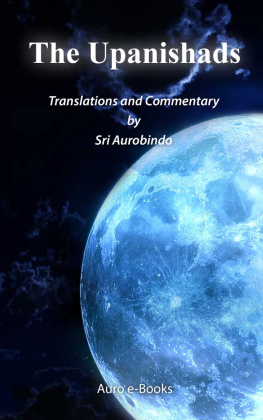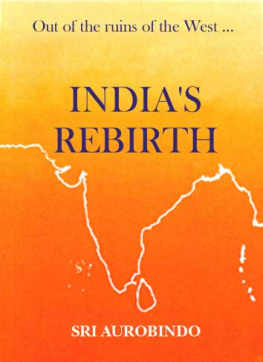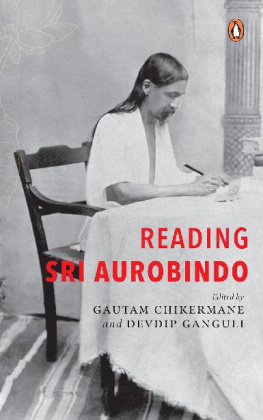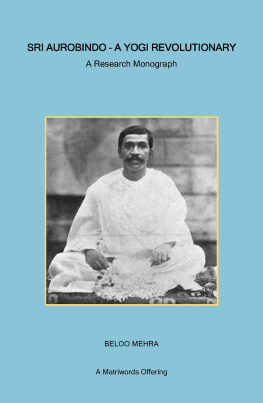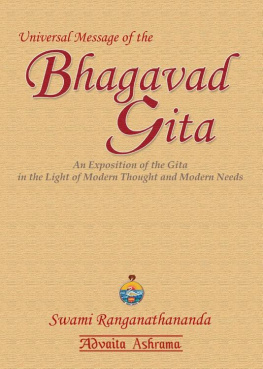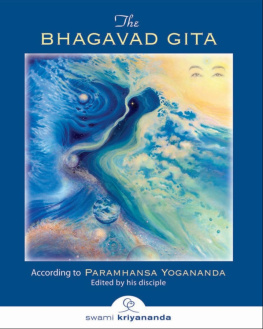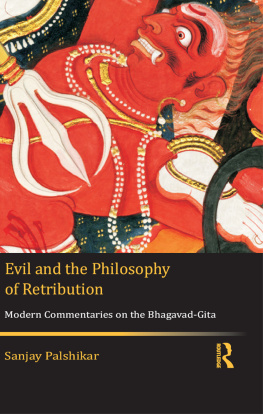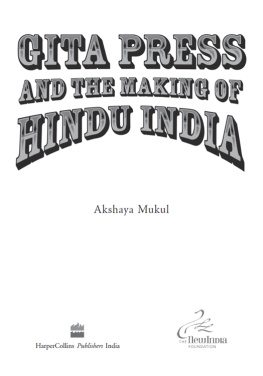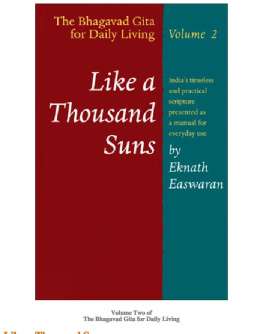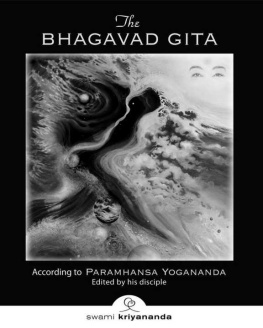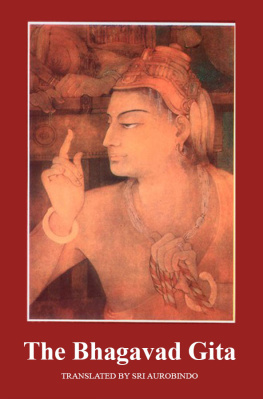Sri Aurobindo - Essays on the Gita
Here you can read online Sri Aurobindo - Essays on the Gita full text of the book (entire story) in english for free. Download pdf and epub, get meaning, cover and reviews about this ebook. year: 2003, publisher: Sri Aurobindo Ashram, genre: Religion. Description of the work, (preface) as well as reviews are available. Best literature library LitArk.com created for fans of good reading and offers a wide selection of genres:
Romance novel
Science fiction
Adventure
Detective
Science
History
Home and family
Prose
Art
Politics
Computer
Non-fiction
Religion
Business
Children
Humor
Choose a favorite category and find really read worthwhile books. Enjoy immersion in the world of imagination, feel the emotions of the characters or learn something new for yourself, make an fascinating discovery.
- Book:Essays on the Gita
- Author:
- Publisher:Sri Aurobindo Ashram
- Genre:
- Year:2003
- Rating:5 / 5
- Favourites:Add to favourites
- Your mark:
- 100
- 1
- 2
- 3
- 4
- 5
Essays on the Gita: summary, description and annotation
We offer to read an annotation, description, summary or preface (depends on what the author of the book "Essays on the Gita" wrote himself). If you haven't found the necessary information about the book — write in the comments, we will try to find it.
Essays on the Gita — read online for free the complete book (whole text) full work
Below is the text of the book, divided by pages. System saving the place of the last page read, allows you to conveniently read the book "Essays on the Gita" online for free, without having to search again every time where you left off. Put a bookmark, and you can go to the page where you finished reading at any time.
Font size:
Interval:
Bookmark:

Sri Aurobindo

VOLUME 19
THE COMPLETE WORKS OF SRI AUROBINDO
VOLUME
THE COMPLETE WORKS OF SRI AUROBINDO
Sri Aurobindo Ashram Trust 1997
Published by Sri Aurobindo Ashram Publication Department
Website: http://sabda.sriaurobindoashram.org
This e-book has been prepared by
Digital Publishing Agency Auro e-Books :
http://www.auro-ebooks.com/
We will be very appreciative if you provide feedback on any error found in this book
by writing to:
Table of Contents
The first series of Essays on the Gita appeared in the monthly review Arya between August 1916 and July 1918. It was revised by Sri Aurobindo and published as a book in 1922.
The second series appeared in the Arya between August 1918 and July 1920. In 1928 Sri Aurobindo brought out an extensively revised edition in book form.
For the present edition, the text has been thoroughly checked against all previous editions and against the manuscripts of the revised Arya.

Sri Aurobindo in Pondicherry, c. 1915

Our Demand and Need from the Gita
T HE WORLD abounds with scriptures sacred and profane, with revelations and half-revelations, with religions and philosophies, sects and schools and systems. To these the many minds of a half-ripe knowledge or no knowledge at all attach themselves with exclusiveness and passion and will have it that this or the other book is alone the eternal Word of God and all others are either impostures or at best imperfectly inspired, that this or that philosophy is the last word of the reasoning intellect and other systems are either errors or saved only by such partial truth in them as links them to the one true philosophical cult. Even the discoveries of physical Science have been elevated into a creed and in its name religion and spirituality banned as ignorance and superstition, philosophy as frippery and moonshine. And to these bigoted exclusions and vain wranglings even the wise have often lent themselves, misled by some spirit of darkness that has mingled with their light and overshadowed it with some cloud of intellectual egoism or spiritual pride. Mankind seems now indeed inclined to grow a little modester and wiser; we no longer slay our fellows in the name of God's truth or because they have minds differently trained or differently constituted from ours; we are less ready to curse and revile our neighbour because he is wicked or presumptuous enough to differ from us in opinion; we are ready even to admit that Truth is everywhere and cannot be our sole monopoly; we are beginning to look at other religions and philosophies for the truth and help they contain and no longer merely in order to damn them as false or criticise what we conceive to be their errors. But we are still apt to declare that our truth gives us the supreme knowledge which other religions or philosophies have missed or only imperfectly grasped so that they deal either with subsidiary and inferior aspects of the truth of things or can merely prepare less evolved minds for the heights to which we have arrived. And we are still prone to force upon ourselves or others the whole sacred mass of the book or gospel we admire, insisting that all shall be accepted as eternally valid truth and no iota or underline or diaeresis denied its part of the plenary inspiration.
It may therefore be useful in approaching an ancient Scripture, such as the Veda, Upanishads or Gita, to indicate precisely the spirit in which we approach it and what exactly we think we may derive from it that is of value to humanity and its future. First of all, there is undoubtedly a Truth one and eternal which we are seeking, from which all other truth derives, by the light of which all other truth finds its right place, explanation and relation to the scheme of knowledge. But precisely for that reason it cannot be shut up in a single trenchant formula, it is not likely to be found in its entirety or in all its bearings in any single philosophy or scripture or uttered altogether and for ever by any one teacher, thinker, prophet or Avatar. Nor has it been wholly found by us if our view of it necessitates the intolerant exclusion of the truth underlying other systems; for when we reject passionately, we mean simply that we cannot appreciate and explain. Secondly, this Truth, though it is one and eternal, expresses itself in Time and through the mind of man; therefore every Scripture must necessarily contain two elements, one temporary, perishable, belonging to the ideas of the period and country in which it was produced, the other eternal and imperishable and applicable in all ages and countries. Moreover, in the statement of the Truth the actual form given to it, the system and arrangement, the metaphysical and intellectual mould, the precise expression used must be largely subject to the mutations of Time and cease to have the same force; for the human intellect modifies itself always; continually dividing and putting together it is obliged to shift its divisions continually and to rearrange its syntheses; it is always leaving old expression and symbol for new or, if it uses the old, it so changes its connotation or at least its exact content and association that we can never be quite sure of understanding an ancient book of this kind precisely in the sense and spirit it bore to its contemporaries. What is of entirely permanent value is that which besides being universal has been experienced, lived and seen with a higher than the intellectual vision.
I hold it therefore of small importance to extract from the Gita its exact metaphysical connotation as it was understood by the men of the time, even if that were accurately possible. That it is not possible, is shown by the divergence of the original commentaries which have been and are still being written upon it; for they all agree in each disagreeing with all the others, each finds in the Gita its own system of metaphysics and trend of religious thought. Nor will even the most painstaking and disinterested scholarship and the most luminous theories of the historical development of Indian philosophy save us from inevitable error. But what we can do with profit is to seek in the Gita for the actual living truths it contains, apart from their metaphysical form, to extract from it what can help us or the world at large and to put it in the most natural and vital form and expression we can find that will be suitable to the mentality and helpful to the spiritual needs of our present-day humanity. No doubt in this attempt we may mix a good deal of error born of our own individuality and of the ideas in which we live, as did greater men before us, but if we steep ourselves in the spirit of this great Scripture and, above all, if we have tried to live in that spirit, we may be sure of finding in it as much real truth as we are capable of receiving as well as the spiritual influence and actual help that, personally, we were intended to derive from it. And that is after all what Scriptures were written to give; the rest is academical disputation or theological dogma. Only those Scriptures, religions, philosophies which can be thus constantly renewed, relived, their stuff of permanent truth constantly reshaped and developed in the inner thought and spiritual experience of a developing humanity, continue to be of living importance to mankind. The rest remain as monuments of the past, but have no actual force or vital impulse for the future.
Font size:
Interval:
Bookmark:
Similar books «Essays on the Gita»
Look at similar books to Essays on the Gita. We have selected literature similar in name and meaning in the hope of providing readers with more options to find new, interesting, not yet read works.
Discussion, reviews of the book Essays on the Gita and just readers' own opinions. Leave your comments, write what you think about the work, its meaning or the main characters. Specify what exactly you liked and what you didn't like, and why you think so.

